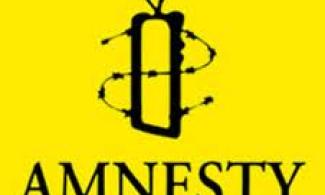
Nigeria: Don’t Shoot the Messenger When You Should be Addressing Human Rights Abuses
Nigeria: Don’t Shoot the Messenger When You Should be Addressing Human Rights Abuses
googletag.cmd.push(function() { googletag.display('content1'); });
8 November 2012
The attack by senior Nigerian officials on an Amnesty International report that documents human rights violations by the country’s police and military is a diversionary tactic – shooting the messenger when the security forces should really be concentrating on putting their house in order.
Anyone who reads the report, Nigeria: Trapped in the Cycle of Violence, will see that Amnesty International condemns the unlawful actions of Boko Haram in just as strong terms as it does those of the government forces.
The report fully reflects Amnesty International’s fundamental commitment to objectivity and impartiality in research, analysis and advocacy of human rights issues.
Researchers for Amnesty International interviewed victims of violence perpetrated by both Boko Haram and the security forces in compiling the report. They spoke to judges, magistrates, doctors, teachers, health and education professionals, journalists, lawyers and representatives of non-governmental human rights organizations.
The final report presents research gathered during numerous visits to Nigeria over two years between 2010 and 2012. It includes information gathered via telephone interviews and draws on court cases, legislation, policy documents, medical reports and video and photographic evidence.
It also includes information provided by representatives of the military, the police and several branches of government following meetings with representatives of Amnesty International in July 2012 to discuss the preliminary findings and observations.
In August 2012 a nine page briefing was sent by courier to security and government authorities in Nigeria containing Amnesty International’s findings and a list of over 90 cases, including names, arresting authority and other relevant information.
The briefing included requests for the cases mentioned to be investigated and invited response and comment. None was received even though Amnesty International would have reflected any comments in the final report.
Full names of victims were not included in the public report published in November to protect the individuals involved.
The Honourable Attorney General of the Federation (HAGF), on behalf of the President of Nigeria and commander-in-chief of the Nigerian Armed Forces, met Amnesty International on 1 November 2012 following the official launch of the report. He stated that all allegations of human rights violations by security forces would be investigated and that Nigeria was committed to ensuring its security forces operate at all times within the rule of law and with respect for human rights.
The HAGF also stated that any state actors found to have violated human rights would be brought to justice. Amnesty International welcomes this statement and hopes that the authorities will take immediate and concrete action to address the real problem and commit to carrying out a full investigation into human rights abuses and violations and to bring perpetrators to justice.
The Nigerian government and the security forces should recognize that the population will not be truly secure until everyone in Nigeria can be confident not only that the risk of attacks from Boko Haram has been reduced, but also that they will not face human rights violations at the hands of the very state security forces mandated with their protection.
Background
Amnesty International’s meetings with army, police, ministers and officials included the Minister of Police Affairs, the Minister of Interior, the Senior Special Assistant to the Honourable Attorney General of the Federation, the Inspector General of Police, representatives from the Office of the National Security Adviser, the Defence Headquarters Spokesperson and the Commissioner of Police for Borno state.
In August 2012 our briefing was sent to – and according to the courier company – received by the following offices:
- Hon. Minister of Police Affairs, (delivered 27 August, 12:34);
- Hon. Attorney General of the Federation, (delivered 27 August, 12:00);
- Hon. Minister of Interior (delivered 27 August, 11:20);
- Hon. Minister of Foreign Affairs; (delivered 27 August, 12:58);
- National Security Adviser (delivered 31 August, 10:30);
- Defence Headquarters, (delivered 27 August, 12:50);
- Inspector General of Police, (delivered 27 August, 14:20);
- Director-General of the State Security Service (SSS) (delivered 29 August, 16:25);
- Comptroller General of Prisons (delivered 28 August, 10:56);
- Commissioner of Police Borno State, (delivered 29 August, 12:00)
- Commissioner of Police Kano State, (delivered 27 August, 11:17).
A briefing was also sent to the Commander of the JTF Borno state but this was returned marked “refused delivery.”
googletag.cmd.push(function() { googletag.display('comments'); });
googletag.cmd.push(function() { googletag.display('content2'); });